Eight radical solutions to the problem of dog mess
- Published
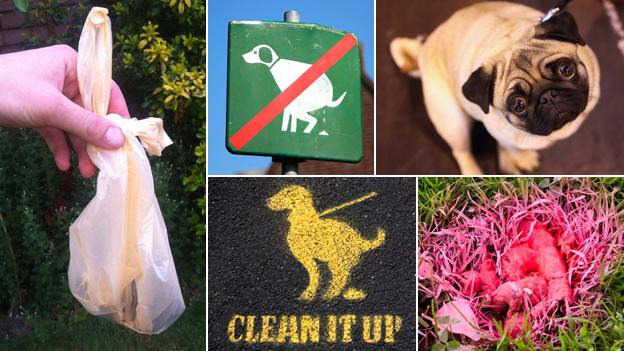
It's a problem that gets on lots of people's nerves - the scourge of dog owners who don't clear up after their pets. So, what can be done to rid streets and parks of their mess?
The signs are easy to spot - the flattened deposit bearing the imprint of a shoe, the anxious parent quickly steering their offspring to one side, the man repeatedly wiping his foot on the verge as if kick-starting a decrepit motorbike.
Few things irritate people quite so much as the abandoned deposits produced by the UK's eight million dogs. It is often suggested that between them they produce 1,000 tonnes of the stuff each day.
In reality there shouldn't be a problem - you own a dog, it eats, it poos, you clean it up. Failing to do so is anti-social, smelly and can spread diseases, including toxicariasis, external.
Dog mess is one of the most common causes of complaints to local councils and four out of 10 people consider it a problem in their local area, says the campaign group Keep Britain Tidy. Along with the Dogs Trust it has launched a campaign, The Big Scoop, external, to remind the minority of bad owners to clean up after their animals.
After a decade of decline, the number of areas affected by dog mess is on the rise, it says. Almost one in five of the recreation areas it surveyed had a problem.
But given the decades' old nature of the problem, what are the radical solutions that could be tried?
Shame people

One of the problems with dog mess is that its earthy tones make it difficult to spot against the ground.
Spraying it a bright colour and leaving it in situ for the owners to consider upon their return has been tried by a number of councils.
In Dorset, the excrement was painted bright green, while Gloucestershire favoured orange and West Dunbartonshire bright pink.
"This pink spray-paint will make this mess really obvious so the owners get the message that it is disgusting," said West Dunbartonshire councillor David McBride.
Elsewhere little flags of the type more usually seen on sandcastles have been left atop piles of poo. In Boston Lincolnshire, they bear "humorous and caustic" messages, including "man's best friend - let's keep it that way" and "flagged up… irresponsible dog owner woz 'ere".
Sometimes the offended party feels the need to go further.
In Todmorden, West Yorkshire, British Waterways decorated a tree with dozens of bags of poo-filled plastic bags, to highlight the problem of owners picking the waste up - only to fling it into the foliage.
And in Brunete, a small town 20 miles from Madrid, volunteers were enlisted to look out for irresponsible owners. Many were identified from the town hall pet database and the excrement returned as "Lost Property" in a box, external bearing the town's insignia.
A 70% drop in the amount of mess found on the streets was reported.
Drawing attention to the problem can make owners realise "how much it upsets other people", says Lance Workman, visiting professor of psychology at the University of South Wales.
"When people take on a dog they think about the positives. People don't always see the responsibility that goes with it."
But there are some people who won't be reached by attempts to shame them. "Most of us feel guilty even if nobody knows what we've done, but some people have a high threshold for guilt," says Workman.
Get the public to help
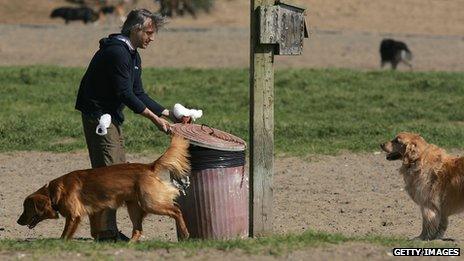
Complaining about the mess left behind in his local park, TV presenter Ben Fogle - who is involved in The Big Scoop - said he sometimes cleared it up himself.
More people are prepared to clear up after others' dogs than many would imagine, says says Helen Bingham of Keep Britain Tidy. A survey conducted ahead of the campaign suggests that one in three people would do so and that six out of 10 would point out an oversight to an owner.
"If you're a dog owner and you do the right thing you know it's an issue. You're also more likely to challenge someone if you see they're not going to [clean up]," says Bingham.
Volunteers often remove abandoned mess and discarded bags as part of a bigger neighbourhood clean-up. And earlier this year a charity suggested launching a dog mess collection service, external, because the village of Littleport in Cambridgeshire was "blighted with it".
"People who clear up are naturally altruistic," says Workman. "But the double-edged sword is that people who don't clean up could realise they can get away with it."
Elsewhere it has been apparent that members of the public can be enlisted if there's an incentive.
Residents of New Taipei City in Taiwan were offered a lottery ticket for every bag of poo they handed in, external.
Officials collected 14,500 bags from 4,000 people, with the scheme said to have halved the amount of excrement in the city.
A woman in her 50s won the top prize - a gold ingot worth $2,200 (£1,400).
Send in the Poover
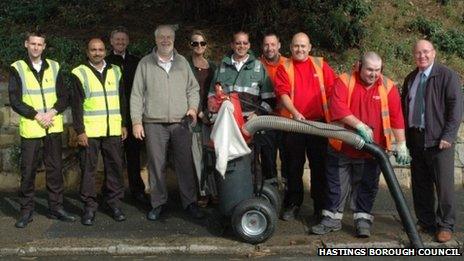
"Henry the Poover" has been used by Hastings Borough Council since 2011
Even the most altruistic citizen would probably prefer not to have to pick up dog mess themselves.
Faced with this realisation a number of councils have introduced "poovers" - something of a catch-all term for dog mess vacuum cleaners.
The actual design varies - from a souped-up wheelie bin in Hastings, external, to a backpack "like something out of the film Ghostbusters", external in Teesdale.
Islington has tried "Poovers" built around motorbikes, as has Nottingham, which also owns an all-terrain cart called "Fido" - short for Faeces Intake Disposal Operation - which is capable of collecting 240 litres of dog dirt and converting it to slurry.
The systems have a family tree stretching back to early 80s Paris.
Officially called ''caninettes'' but almost always referred to as ''motocrottes'', external, a small army of scooters equipped with vacuums were sent out to clean up after the city's chiens.
Sadly, the scooters were withdrawn in 2002 - criticised for cleaning up just 20% of dog droppings. Paris opted for fines instead, but retains something of a reputation, with one official citing it as a reason for losing the Olympics to London., external
Go on a stake-out
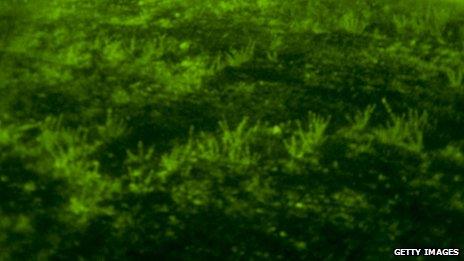
There may or may not be some dog mess in this picture
Plain clothes officers, surveillance vans and wardens with night vision goggles, external were used by Hydburn Council, to enable the handing-out of £75 on-the-spot fines to irresponsible owners.
"With night vision, the dog wardens can see that much further along footpaths where the problem occurs and catch offenders." a councillor said.
It is a particularly novel example of the use of fixed penalty notices to deal with those who do let their dogs foul on pavements and in parks. The fines are typically between £50 and £80.
The law is clear, says Keep Britain Tidy. "It is the the responsibility of the dog owner or the person in charge of the dog to clear up any dog foul left by their dog."
And simply being oblivious - or pretending that you are - is not an excuse.
"The regulations state specifically, that being unaware that the dog has fouled, or not having a suitable means of removing the faeces is not a reasonable excuse for failing to clean up after your dog."
In some cases a clampdown on those who fail to clean up can see many people fined. In Blaenau Gwent more than 2,000 fixed penalty notices were issued, external after a private firm was employed.
But the results aren't without their critics. Islington Council was criticised after it spent £134,000 employing a team of 22 dog mess wardens, but issued just 26 fines in three months., external
Such criticism misses the point says Bingham: "There's a high cost to enforcement, which is not covered by the fines. It's an education thing, not a revenue thing."
Introduce DNA testing

A dog DNA database could quickly solve the problem, the leader of the Isle of Wight's council suggested earlier this year.
"We could test samples against the database and trace it to the dog's owner, external," said Cllr David Pugh. "I imagine we would see an immediate cessation to the problem."
Although the idea was dismissed by critics as an expensive step for a council with a tight budget, it is something that has been tried elsewhere.
Residents at an apartment complex in Plano, Texas, external, were warned that they faced a $250 (£160) fine if droppings were traced back to their animals.
Similar action has been taken in other US cities and mooted as a solution elsewhere around the world, including Hernani, near San Sebastian in Spain, external, Petah Tikva near Tel Aviv, external and North Down in Northern Ireland.
In the US, testing is provided by a company called PooPrints, which is marketed to property managers as "the only permanent, 'set it and forget it' solution for dog waste".
Animals living in a housing complex are swabbed, their DNA recorded and kept on file, to be compared against any deposits subsequently found. Errant owners can then be upbraided and even fined.
Take direct action
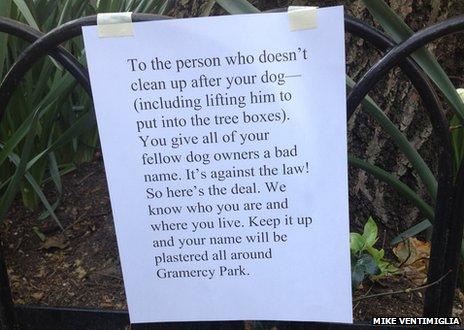
The author of this note seems to be annoyed
"Are you the irresponsible (that means couldn't care less) owner of the large dog that is regularly fouling this pavement?" read the laminated sign.
"I am sick, almost physically, of clearing up after you and your dog after each visit., external"
It was an approach that produced results, as demonstrated by a follow-up sign which thanked "all dog owners who have helped keep the pavement clean".
Other DIY signs strike a similar note of frustration with bad owners, including one in New York to "the person who doesn't clean up after your dog (including lifting him to put him into the tree boxes), external".
Concerned citizens have sometimes gone further.
In 2005, a young South Korean woman who refused to clean up after her small dog did its business on a subway train was confronted by other passengers.
Still unmoved, her photo was taken and posted on websites, which identified her and pored over details of her life.
She became known as "Dog Poop Girl, external".
It's not for the squeamish, but a step further down the path towards revenge is the Russian model who ended an argument, external with a woman who let her dog foul the pavement by using a tissue to collect it before flinging it into her convertible.
She noticed.
Such an approach may of course risk a breach of the law. But extreme reactions are "part of our disgust response", says Workman. "There's something about dog faeces. It's known to contain parasites."
Ban dogs
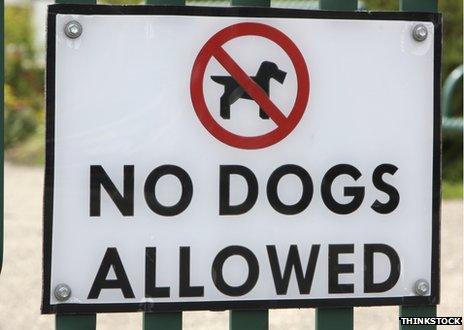
It's the ultimate solution to the problem. Simply ban dogs.
In the UK restrictions are most often seen on beaches, particularly those awarded Blue Flags for cleanliness.
"A lot of beaches will have timed dog bans on them," says Bingham. It might mean that dogs are banned during the summer months, or during the day.
Away from the coast, restrictions are less common, but are sometimes applied to places like playgrounds and playing fields, external.
A ban on dogs in 45 locations in East Yorkshire, external, includes cemeteries and green areas on new housing estates, is being considered. Dogs could be banned from play areas in Penarth, external and Caerphilly, external, because of the problem of dog fouling.
It upsets the good dog owners, says the Kennel Club. "If you're a normal, responsible dog owner and you hear all of a sudden that you're going to be banned from a certain area you're going to be really hacked off."
Supporters of such measures might like to look abroad for inspiration.
For many years dogs were banned in the Icelandic capital of Reykjavik and other urban areas, amid fears of disease.
When her family moved to Vopnafjörður on the east coast "there were no dogs allowed in the town, but I still brought mine, and one day it ran out without a leash", said former Miss World, Linda Pétursdóttir. "The mayor came and told my dad that if it happened again he would have to shoot the dog.", external
Things are far more relaxed now, but all dogs must be registered and owners have to ask neighbours for their permission to move a dog into a block of flats.
Elsewhere tight restrictions remain. In Iran, a ban on walking dogs in public was announced earlier this month, over concerns that owners were "blindly" imitating Western culture, external.
It's a solution unlikely to find many supporters in the UK.
"Some people might like to see that, but in the UK there are massive welfare implications," says the Kennel Club. "Dogs need the exercise and to have a daily run around."
Keep them on their toes
There is already less dog mess around than there was 15 or 20 years ago, says Keep Britain Tidy's Helen Bingham.
"From the 70s and 80s people remember dog poo going white because it stayed there for so long."
Not only have councils got better at cleaning it up, but dog owners are better behaved. "In the past people did not pick up and bag dog poo".
There have already been big changes - from the introduction of dog mess bins to the dedicated exercise areas in many parks which make it easier to keep an eye on their animals.
"The very fact that there's a dog poo bin is sending you a reminder, along with the signs that tell you to use them," says Bingham.
To an extent it has worked. When Keep Britain Tidy published its first How Clean is England report for 2001/2, 10% of sites surveyed had dog mess. By 2004/5 the figure had fallen to 6%. After hovering between 6% and 8% in subsequent years, the figure for 2011/12 was back up to 9%, external. It's often in the spots where you least want to find it, including parks and sports fields. "A lot of sports clubs will have to go out and clear up before playing."
But the biggest factor in changing people's behaviour is campaigning, says Bingham - people need to be reminded that they have a duty. Among other things The Big Scoop will see bags and flyers handed out in problem areas.
Another approach might be to offer rewards and incentives, says consultancy Blue Rubicon. "Attention grabbing tactics could be a mass distribution of free or designer scoopers, or the introduction of new, improved pedal powered dog poo bins all designed to help make clearing dog mess a no-brainer," says associate director Liz Waller.
Using pictures of staring eyes on signs warning people to clear up is another possibility, says Workman.
Studies have shown such techniques can be effective. At Newcastle University bike thefts were reduced 62% by putting pictures of staring eyes above cycle racks. A 2010 study found similar techniques made it more likely that trays would be cleared away.
"There's something about human eyes and the feeling you're being watched," says Workman.
You can follow the Magazine on Twitter, external and on Facebook, external